Former Residence of Hu Yaobang
The Former Residence of Hu Yaobang or Hu Yaobang's Former Residence (Chinese: 胡耀邦故居; pinyin: Hú Yàobāng Gùjū) was built in the late Qing dynasty (1644–1911), which is located in Cangfang Village, Zhonghe Town, Liuyang, Hunan.[1] It covers a building area of about 450-square-metre (4,800 sq ft), embodies buildings such as the old houses, the Yaobang Square, the Ancestral Temple , the Ancestral Grave, the Cultural relics Exhibition Hall, the old well, etc.[1][2][3][4][5][6]
| Former Residence of Hu Yaobang | |
|---|---|
胡耀邦故居 | |
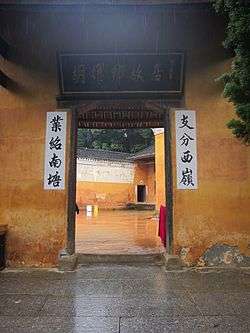 Entrance of the Former Residence of Hu Yaobang. | |
 | |
| General information | |
| Type | Traditional folk houses |
| Architectural style | Chinese architecture |
| Location | Zhonghe Town, Liuyang, Hunan |
| Country | China |
| Coordinates | 28°04′54″N 113°53′07″E |
| Completed | 1851–1862 |
| Owner | Government of Liuyang |
| Technical details | |
| Material | Brick and wood |
| Floor area | 450 m2 (4,800 sq ft) |
| Design and construction | |
| Architect | Hu Mingzhong Hu Mingjing |
History
In the period of the Xianfeng Emperor (1851–1862) in the Qing dynasty (1644–1911), Hu Yaobang's great-grandfather Hu Mingzhong (胡明鍾) and Hu Mingzhong's elder brother Hu Mingjing (胡明鏡) built it.
On 13 November 1915, Hu Yaobang was born in here.
In 1962, Hu Yaobang returned home and visited it, Hu talked to his relatives, "Don't rebuilt it".
In February 1995, the People's Government of Liuyang City rebuilt it. In September, Hu Yaobang's wife Li Zhao (李昭) returned home and visited it.
In 1996, it was listed a Hunan Province's most important culture and relics site.
In 2002, it was listed as a Provincial Patriotic Education Base.
In February 2005, the Cultural relics Exhibition Hall was built.
On 6 May 2013, it was listed as a "Major National Historical and Cultural Sites" by the State Council of China.[1]
On 12 April 2014, Hu Jintao visited the Former Residence.[7][8][9]
Gallery
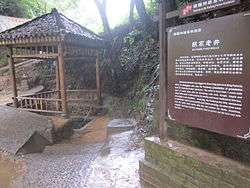

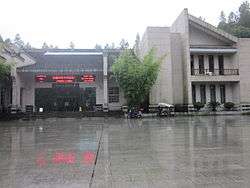
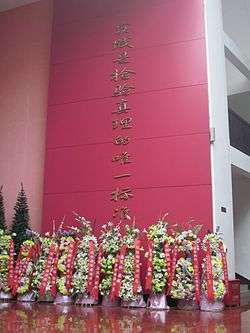
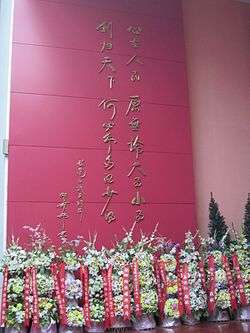
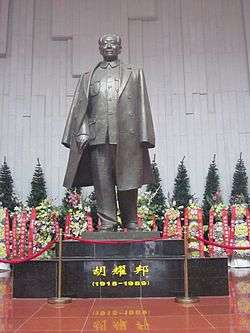

References
- Wang Xijia (2014), p. 19.
- 红色旅游 长沙市浏阳胡耀邦故里旅游区. sina (in Chinese). 2013-07-15.
- 胡耀邦故居成全国重点文保单位 去年获批4A景区. Tencent (in Chinese). 2013-05-07.
- 走进湖南胡耀邦故居. sohu (in Chinese). 14 April 2014.
- 胡耀邦故居列入第七批全国重点文物保护单位. people.com.cn (in Chinese). 2013-05-06.
- 港媒:胡锦涛到访胡耀邦故居 向其铜像鞠躬致敬. 163.COM (in Chinese). 14 April 2014. Archived from the original on 21 August 2014.
- Zhang Wenzhong (张文中) (2014-04-17). 胡锦涛参观胡耀邦故居有什么政治含意?. rfi.fr (in Chinese). Retrieved 2019-11-11.
- 胡锦涛敏感时机参访胡耀邦故居. voachinese.com (in Chinese). 2014-04-12. Retrieved 2019-11-11.
- 胡锦涛上周五参观胡耀邦故居. qq.com (in Chinese). 2014-04-14. Retrieved 2019-11-11.
Bibliography
- Wang Xijia (2014). 长沙史话 [A Brief History of Changsha] (in Chinese). Beijing: Social Sciences Academic Press. ISBN 978-7-5097-6662-0.CS1 maint: ref=harv (link)
| Wikimedia Commons has media related to Hu Yaobang's Former Residence. |